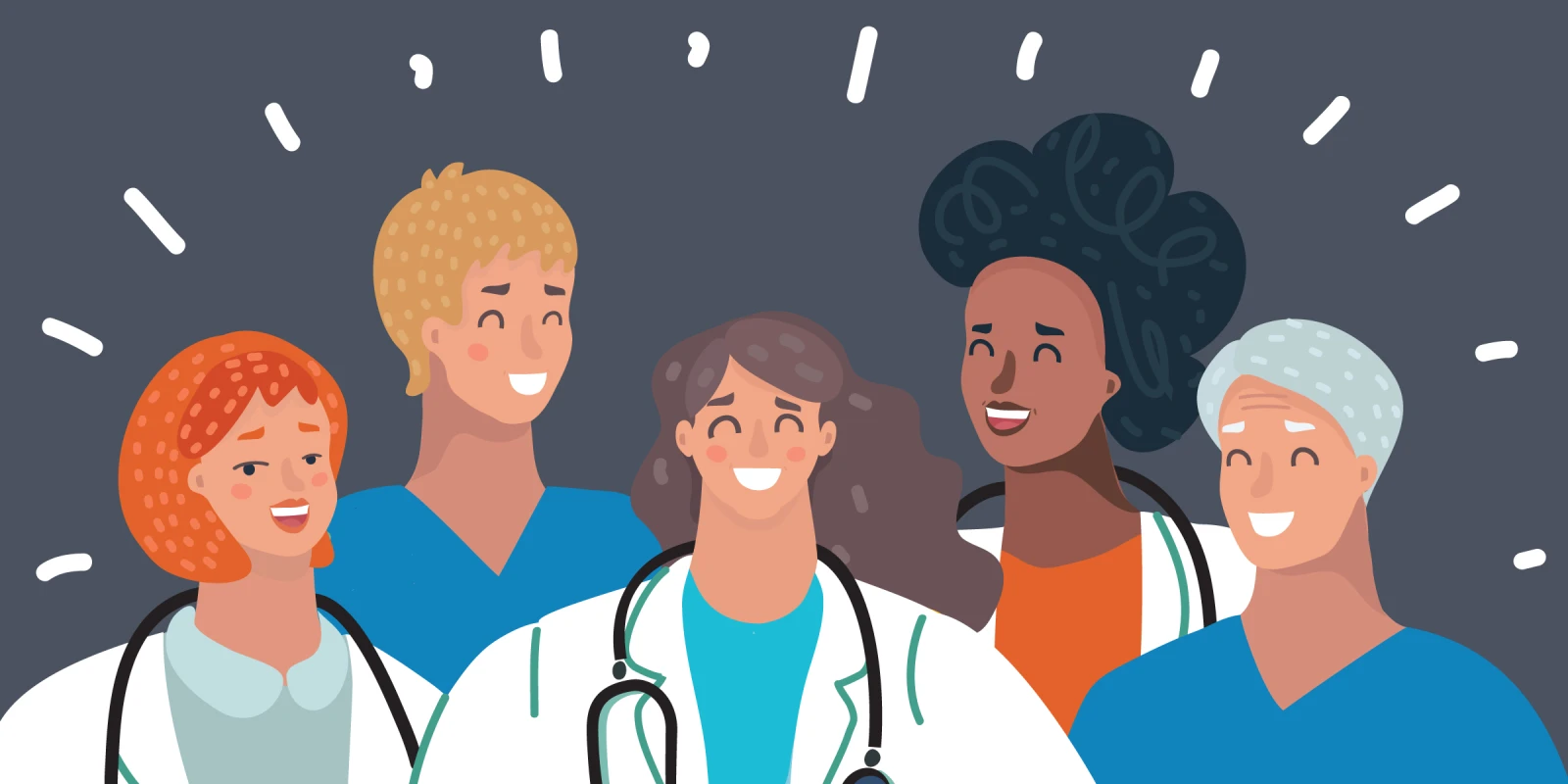As the adage goes, laughter is the best medicine. Humor is well-known to have positive effects on health, from relieving physical tension in one’s muscles to decreasing blood pressure and increasing immune function. Additionally, studies have shown that using humor in clinical encounters leads to greater patient satisfaction and better patient compliance. In these tough times, what can clinicians who moonlight as — or in some cases, have become full-time — comedians tell us about the myriad physical and emotional benefits of humor in medicine?
For Gabriella Oloye, a stand-up, comedic actor, and family NP based in California, the connection between the two disciplines is straightforward: “In both cases, the person who's offering the comedy or offering the medical service is giving something of themselves and also trying to help others. … I think the main tie between the two is that both of them are a form of service in a way.”
The other clinicians Doximity spoke to likewise believe that comedy and medicine go hand in hand. When asked if medicine is inherently funny, Coloradan Bradley Nieder, MD, a former emergency medicine physician and now full-time comedic speaker under the moniker the Healthy Humorist, said that he’d agree with that sentiment: “I think it’s funny, it's tragic, it's absurd. It's filled with funny and silly moments.”
Both medicine and comedy require bravery, stamina, and a love of engaging with and serving others. However, given that patient health is no laughing matter, what type of humor, deployed under which circumstances, is truly beneficial?
Humor as Ice-Breaker
Angel Rentas, a comedian and NP based in Connecticut who specializes in cardiac electrophysiology, explained that he uses casual humor in the clinical setting to gain patients’ trust and build rapport. NP Rentas began his comedy and health care careers nearly simultaneously, and believes that the secret ingredient underlying each is an “understanding of social interaction” — whereupon one utilizes one’s natural social graces to make the person (or patient) before one feel seen and comfortable. “The way I [do] comedy is a lot like [how I practice] medicine,” NP Rentas shared. “You come in and you talk to them, you're assessing them, you start … trying to figure out the[ir] story.”
Having a background in comedy may also be a way of finding common ground with “difficult” patients. NP Oloye explained, “One thing that [comedic acting] has really taught me is seeing [the goodness] in any and every situation, because when you're playing a villain, you can’t be like, ‘Oh, this person's evil.’ You have to be like, ‘Oh yeah, this person was right for wanting to skin 101 dalmatians.’ And sometimes in medicine, you have patients who are disrespectful to you or are just very challenging to work with. And I just think about their perspective … because of my [acting] experience.”
In addition to setting patients (and clinicians) at ease, humorous rapport can work as a disarming mechanism. NP Rentas explained, “I kind of use humor to lighten [patients] up a little bit. And then they become a little more relaxed and they start telling me more stories and they're truthful [about their behaviors].”
Humor Has a Time and Place
Joking around with patients is not always a natural, or welcome, process. The clinicians Doximity spoke to explained that they’re strategic about when they utilize humor with patients, and agreed that they would wait for the patient to make the first quip. NP Oloye shared, “When I use comedy, I let the patient initiate first because I always try to shape [my practice] around how the patient wants the visit to go. … I kind of vibe off of them.” In this way, she is able to avoid the discomfort and awkwardness that might occur if a patient is not in the mood to joke, or even perceives such levity as insensitive.
John Kelly, MD, a comedian and orthopaedic surgeon based in Pennsylvania, echoed NP Oloye’s sentiments. “When people come to see an orthopaedic surgeon, they’re nervous. So you gotta read the room. … That’s very important.”
For Dr. Kelly, as for the other clinicians, humor, like medicine, is primarily about healing. “[When I do comedy,] I let people know: You're not gonna get crass, offensive material. You're gonna get uplifting stuff that’s positive. It's gonna make you feel better.” This positivity-oriented approach to humor can be particularly handy during stressful medical situations. “I do a lot of knee surgery,” Dr. Kelly explained. “Sometimes you do an ACL surgery and someone's really despondent that they’re going to lose their season … so I think you have to recognize what patients need.”
Humor as Control
The situation where humor may have the greatest effect, however, can paradoxically be one where it’s least expected: post-diagnosis of terminal or serious illness. According to NP Oloye, “I've had some patients who have received some really unfortunate news — and they started joking about it.”
Dr. Nieder explained the phenomenon thusly: “That morbid humor, that gallows humor that tends to creep into the ER or into the hospital, I think it's really a necessary outlet for folks who are dealing with life and death and illness and terrible things that happen.”
Reflecting on whether he felt there was anything too dire to joke about, Dr. Nieder shared, “I go back to [Holocaust survivor and psychiatrist] Dr. Viktor Frankl, who wrote, ‘I never would have made it if I could not have laughed. It lifted me momentarily out of this horrible situation, just enough to make it livable.’ … You think, man, if [someone in a concentration camp] laughed, then yeah, we can laugh during a pandemic. We can laugh during life and death situations. … It doesn't mean funny things don't happen still. And that we can't get that little release, if you will, of laughing.”
NP Rentas concurred: “Gallows humor, there’s a purpose for that. … It relieves a lot of this pent up anxiety and it expresses something for you that you can't express in reality … The humor side, it gives you a different locus of control. So you can’t control dying, but you can control the way you look at it, you can either be sad or you can … say, I’m gonna make it kind of funny.”
Dr. Kelly offered a similar perspective: “When you do comedy, it helps you focus. … It brings you back into the present moment. And also I feel better when I'm telling jokes too, because I just won’t think about [stressors]. … [Comedy] is part of my own therapy to deal with the stress of medicine and it works and I make other people happy.”
As for how to maintain that mindfulness day in and day out? Dr. Kelly may have the answer: “If you have a tough crowd, just keep smiling and stick to your script. Just keep smiling. It's like being in the OR when the lights go out and they run out of power: just stay positive. Just keep working.”
Humor as Medicine
Finally, even COVID-19 has offered up comedic opportunities. Dr. Nieder joked that his bit about handwashing — though certainly relevant to a clinical audience pre-2020 — lands harder now. Reflecting on his career switch, he added, “I still feel like I didn’t give up medicine. I’ve got an unconventional practice, an unorthodox way. Rather than seeing people with the white coat in the doctor’s office or the ER, I'm trying to get them to laugh, live a happier and healthier life, and maybe make them realize that laughter really is good medicine. … And if they can lighten up and laugh at themselves and … their situation a bit and have a sense of humor, that can go a long way toward good health. … I think having a sense of humor and being able to laugh is one of those [healthy] lifestyle choices that we should all make. And it does have an impact on our lives.”
Despite the challenges of the pandemic, one thing is for certain: Medicine is — and always will be — “inherently funny,” and these clinician-comedians will be making the most of whatever comes their way with grace, style, and yes, humor.
Check out some of these comedians’ bits below:
What would you like to read about? Share your suggestions on this form.
Image by cosmaa / Getty







